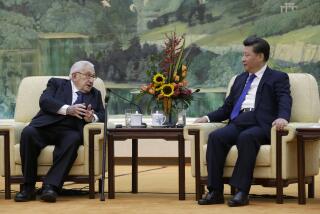Global Leaders Praise Thatcher’s Achievements and Determination : Reaction: Even her foes temper their scorn with admiration for the formidable ‘Iron Lady.’
- Share via
Worldwide reaction to Margaret Thatcher’s resignation reflected admiration for her fierce determination and stunning achievements. Even her foes tempered scorn with praise for a formidable adversary.
In resignation, as at the peak of her powers, the British prime minister left nobody speechless. The “Iron Lady” has long been described as stubborn, exasperating and often amusing, but never boring.
“We will remember her for her great contribution to good relations between the West and the Soviet Union,” said Foreign Ministry spokesman Gennady I. Gerasimov in Moscow.
The Soviets know Thatcher best for her now-famous remark, when President Mikhail S. Gorbachev was still only a contender for the Soviet leadership, “I think Mr. Gorbachev is a man we can do business with.”
Vitaly Ignatenko, spokesman for Gorbachev, told the independent Interfax news agency: “Political, economic and cultural ties between our countries have become of greater importance” in the Thatcher era. “Our relations . . . were marked by constructivism and dialogue.”
Iraq saw the Persian Gulf crisis as the cause of her downfall.
“Anyone who takes hostile positions unjustly against Iraq will go to hell,” said Information Minister Latif Jasim at a news conference in Baghdad, the Iraqi capital. “She has lost her party, her job and even her reputation, so she will pass a very hard time as an old woman.”
In Argentina, which lost the Falkland Islands War to Britain in 1982, President Carlos Saul Menem said Thatcher’s resignation will have no effect on Argentine relations with Britain and warned Argentines not to “delude themselves” into thinking London now will be more flexible in discussing sovereignty of the Falkland Islands.
There was undisguised bitterness in the comment of Argentina’s Nicanor Costa Mendez, foreign minister during the Falklands War.
“I can’t say that it makes me sad,” he said. “I believe that the extreme positions--unnecessarily extreme, unjustifiably extreme--of the prime minister were one of the causes of the war, and one of the biggest impediments to achieve agreement afterward.”
Socialist President Mario Soares of Portugal singled out “her systematic opposition to the advances of the European Community.”
“During her long mandate,” he said, “the preoccupations of social justice receded many times before purely development objectives, causing a climate of discontent in British public opinion to which Mrs. Thatcher appeared insensitive.”
But Soares also lauded the British prime minister as a “determined politician (who) took courageous positions on critical occasions in international life and without doubt marked an era in the contemporary history of her country.”
German Finance Minister Theo Waigel noted, “Despite her critical position on some questions of European integration, she accomplished a great deal for European politics.”
French President Francois Mitterrand, in a letter striking a neutral tone, told Thatcher she had “marked an important moment in the history of your country and that of Europe.”
Former French President Valery Giscard d’Estaing, now a legislator in the European Parliament, said Thatcher’s decision to quit was “dignified and courageous.”
“Margaret Thatcher will be seen with Winston Churchill as the greatest British prime minister of the last 50 years. The curtain has fallen on the Iron Lady. She deserves our congratulations,” he said.
The president of the European Community Executive Commission, Jacques Delors, who has clashed repeatedly with Thatcher, expressed his “greatest esteem” for her despite their “disagreements” over Europe.
Others were not quite so diplomatic.
“I think she has been part of history for some time,” said Volker Ruehe, general secretary of German Chancellor Helmut Kohl’s Christian Democratic party.
“I think it’s the right time for her to step down,” he said. “It is the chance for a new beginning and a victory for the Conservative Party, which is very important for stability in Europe.”
The former Italian prime minister, Giovanni Spadolini, said Thatcher compiled an impressive record in her 11 years in office.
“We must render homage to the intrepid character of Mrs. Thatcher, who has shown a lofty quality and a stature that consecrates her in the history of her country,” he said.
“I believe that every European citizen cannot forget the overall performance of one of the protagonists of the political life of recent years,” said Spadolini, now president of the Italian Senate.
Dutch Prime Minister Ruud Lubbers said, “In the many years that she placed such an important stamp on the policies of the United Kingdom, Mrs. Thatcher has shown that she does not avoid making difficult decisions that she deems to be in the nation’s interest. This, too, is such a decision which deserves respect.”
Israeli leaders regretted Thatcher’s resignation. Prime Minister Yitzhak Shamir told Army Radio he felt “heartfelt sorrow, since we all know the special personality of Mrs. Thatcher who acted in a great many ways for her country.”
“She most certainly has an iron logic and an iron character,” Shimon Peres, leader of Israel’s opposition Labor Party, said in alluding to Thatcher’s nickname, the “Iron Lady.”
Said Prime Minister Bob Hawke of Australia, “Even those like myself who have been at odds with Margaret Thatcher on particular issues have admired her courage and tenacity of purpose.
“Whatever the forces arrayed against her, she was always prepared to pursue with the utmost vigor those positions in which she believed.”
More to Read
Sign up for Essential California
The most important California stories and recommendations in your inbox every morning.
You may occasionally receive promotional content from the Los Angeles Times.













